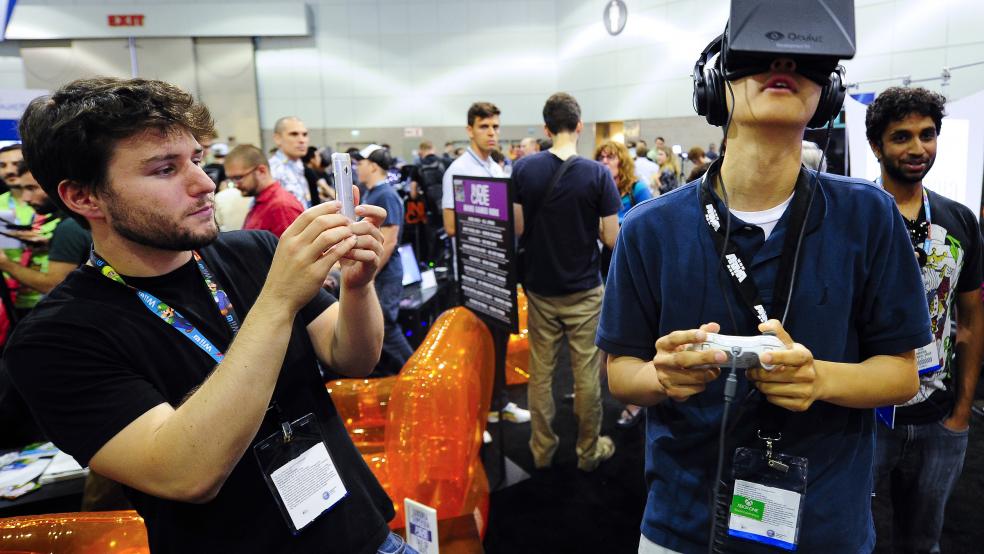It may be a smart business decision, but to many, the Oculus Rift has gone the way of the dark side.
The Virtual Reality company is being purchased by Facebook in a deal totaling $2 billion.
“Oculus has the chance to create the most social platform ever, and change the way we work, play and communicate,” said Facebook CEO Mark Zuckerberg in a press release issued Tuesday.
This opens the door for an immersive spin on massive multiplayer online (MMO) games, as well as social simulators like Second Life, which could now appeal to a whole new audience of Facebook users. But many former supporters of the technology see it as a slap in the face to the peripheral’s origins.
Related: 10 Awful Video Game Console Flops
A Kickstarter sensation and internet darling, the Rift caused huge buzz when it debuted at the Electronic Entertainment Expo in 2012, raising $2.4 million in crowdfunding following the prototype’s award-winning reveal. A new take on the age-old concept of virtual reality goggles, the Rift allows viewers to look 360 degrees around them, benefiting from this gaming generation’s vastly improved graphics technology and improved hardware that reduces latency and other obstacles that waylaid its predecessors, like Nintendo’s spectacular flop, the Virtual Boy.
After several years in development, and several hiccups relating to user nausea and game calibration issues, the Rift looked set to release in early 2015. Gamers and VR enthusiasts alike have been passionately awaiting the technology. Many have ordered $350 development kits in order to create their own homebrew software for the platform, or just to experiment.
However, the Rift’s $2 billion acquisition by Facebook could derail all that goodwill.
Many of the Rift’s earliest supporters, who emptied their pockets in the crowdfunding stages with the hope of seeing an open-ended, developer-friendly piece of hardware, quickly disowned the project after the news broke.
Though there is a fairly predictable furor surrounding Facebook’s questionable history regarding privacy practices, there is also concern surrounding how the deal will influence the Rift’s content, suggesting that Facebook will likely restrict the once-open development platform.
Related: Video Game Changers: 21 Titles That Rocked the Industry
While Facebook has offered games before, they have typically been casual affairs developed by companies like Zynga and its ilk, plagued with microtransactions — small purchases for in-game items — and rife with product placements for other companies. Zuckerberg’s words in his presentation to shareholders did little to allay any fears.
“We view this as a software and services thing,” Zuckerberg said in a presentation to shareholders made on Tuesday afternoon. “We can make it so that this becomes a network where people can be communicating and buying things and virtual goods, and there might be advertising in the world, but we need to figure that out down the line.”
This heavily suggests a Second Life-esque virtual reality “game,” replete with shopping and potential advertising. In other words: the very antithesis of the presumed purity of the Rift’s original goals.
Though Oculus’s co-founder, Palmer Luckey, braved the furious hordes of the Internet by assuring in a Reddit thread that they retained the same – if not more – control over their project, this hasn’t stopped the somewhat hyperbolic prophecies that the Rift will be able to do nothing more than play VR Farmville.
“We were in talks about maybe bringing a version of Minecraft to Oculus. I just cancelled that deal. Facebook creeps me out,” said Swedish developer Markus Persson in a tweet on Tuesday. Persson, widely known as “Notch,” is the lead developer behind Minecraft, a free-roaming building game that has grown into an indie sensation, with some 14,680,600 units sold and $128 million in 2013 profits for parent company Mojang.
Related: Facebook’s Zuckerberg Bets Big on Virtual Reality
Persson’s not the only one shunning the system. Several other developers, such as the creator of Proscenium games, remain adamant that they will refuse to offer Facebook advertising or integration in their products. According to The Huffington Post, a support article on Oculus VR’s website detailing how to cancel a Rift pre-order was one of the most-trafficked articles on the front page of Reddit.
Other developers have come out in support of the deal, and some have pointed to Facebook’s purchase of the still-functional Instagram as proof that Zuckerberg’s ownership doesn’t necessarily mean that a product can’t continue working unfettered.
All this froth will almost certainly settle down soon enough, provided that Facebook and Oculus VR can quickly provide proof that the deal will not soil the company’s original goals.
For now, though, Facebook and Oculus have some PR work to do, as furious former supporters move to the lesser of two virtual reality evils – Sony’s Project Morpheus.
Top Reads From The Fiscal Times:





